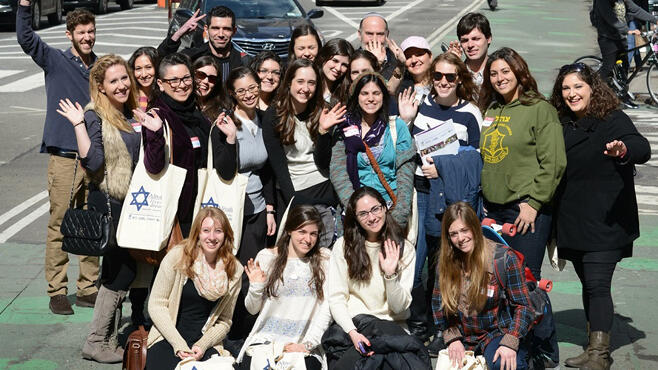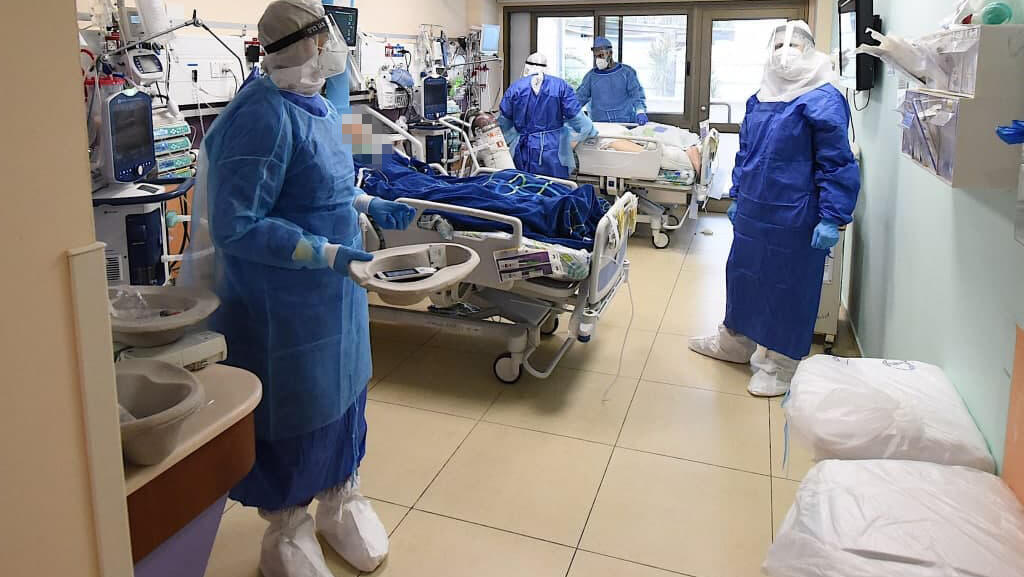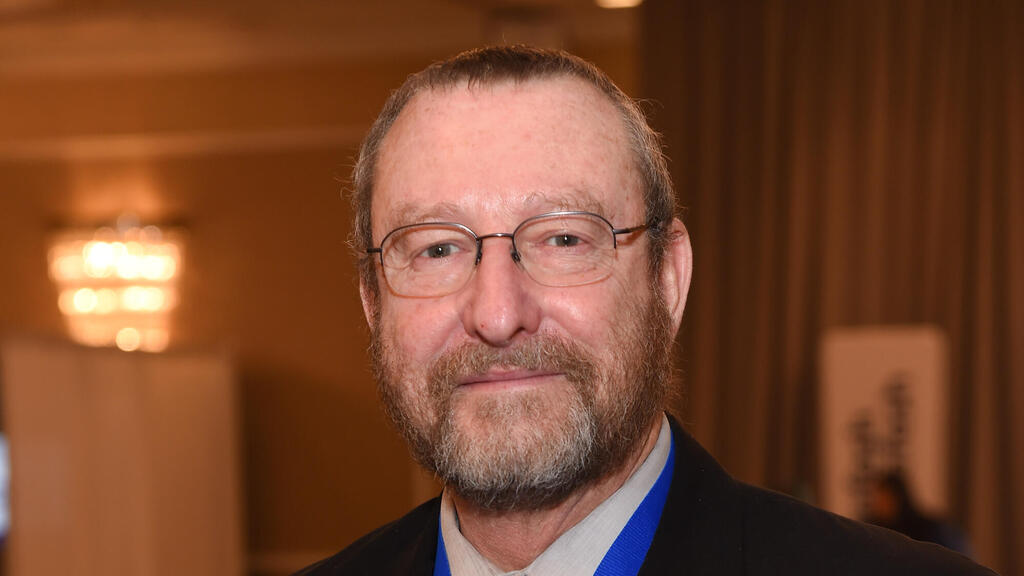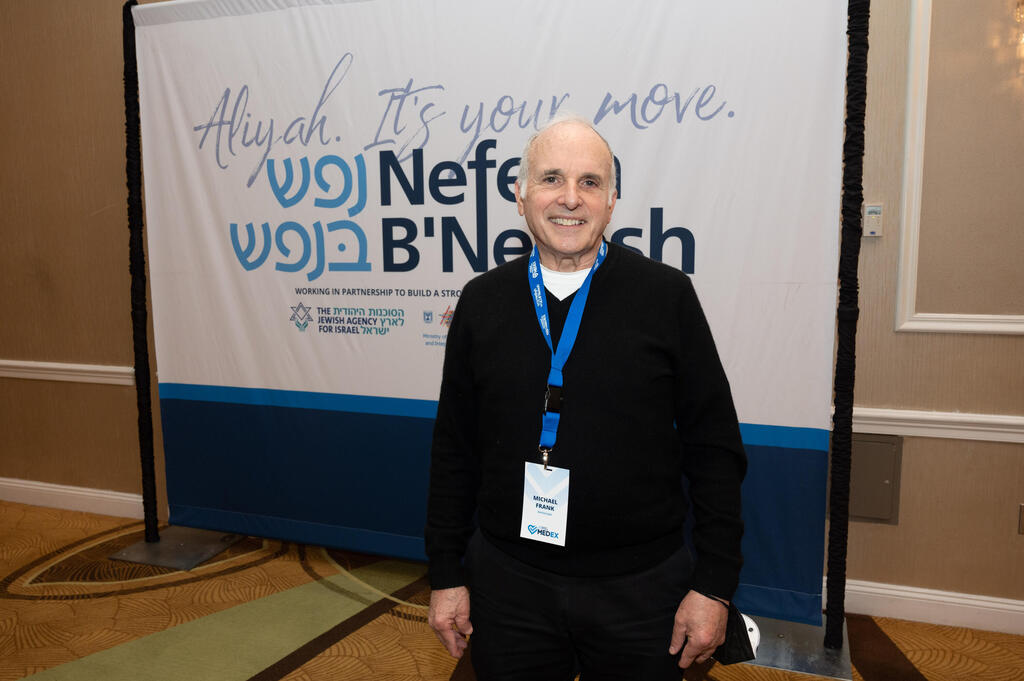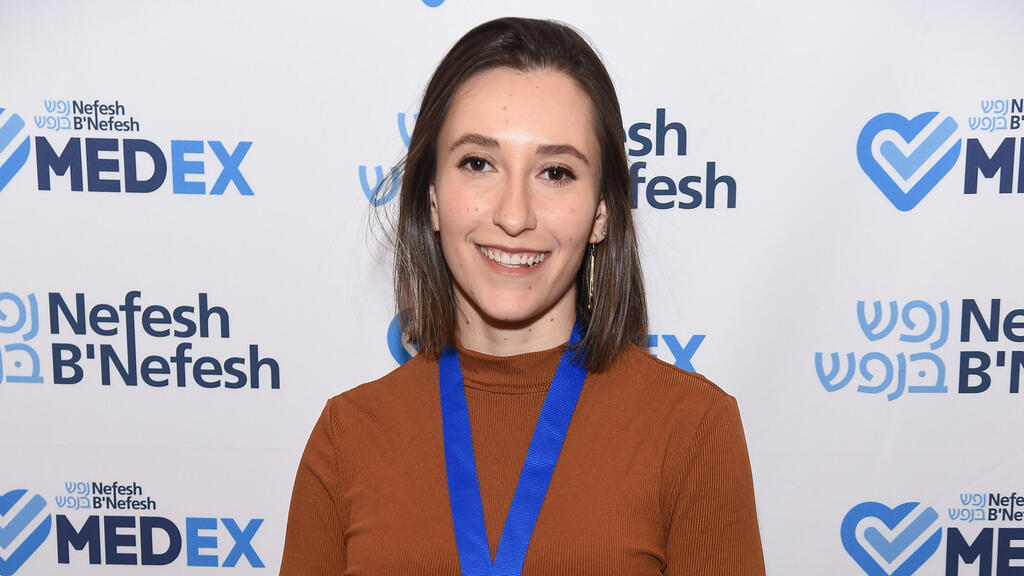Getting your Trinity Audio player ready...
In 2021, some 4,500 new immigrants arrived in Israel the United States, of whom 96 were doctors and 286 experts in various medical fields, offering a needed boost to the Jewish state's health system.
This immigration wave is set to help Israel withstand the predicted shortage of medical staff in the coming years, triggered by retirement of thousands of professionals who arrived during the Aliyah from the former Soviet Union in the early 1990s.
The number of new immigrants in 2021 was higher by 1,000 compared to the annual average in recent years, and the tally is expected to climb even further in 2022.
One reason for said increase appears to be the MedEx conference, or "Aliyah fair" organized by Nefesh B'Nefesh NGO, which helps Jews from North America to find jobs in Israel before immigrating - with the assistance of Aliyah and Integration Ministry, the Jewish Agency, Jewish National Fund, and JNF-USA.
The purpose of the conference, which was held in New Jersey a few weeks ago in cooperation with the Health Ministry and Israel Medical Association, was to assist the medical personnel who wish to make Aliyah to Israel by offering them an employment license and a safe position in the health system.
"During the COVID pandemic, there was a huge increase of doctors who wished to immigrate to Israel," said Ronen Foxman of Nefesh B'Nefesh.
"This also includes Americans who already made Aliyah, but continued to work in the U.S.. When Israel closed its borders due to coronavirus, many medical personnel found themselves either stuck in the U.S. or without a job in Israel. It was the first time since the establishment of the Jewish State that Aliyah had been halted. Even during our toughest wars, immigration never stopped," Foxman added.
Immigration from the North America in general, and the U.S. in particular, is considered fruitful when it comes to providing highly-skilled workers, having an unprecedented absorption success rate. According to the Central Bureau of Statistics, about 90% of North American immigrants are well integrated in Israel, and stay in the country permanently.
"This is a remarkable statistic, and when it comes to doctors or medical specialists, most of them secure a position before they arrive, so the chances of being unemployed are slim," said Foxman.
The lower wages in Israel, the high cost of living, and the many absorption hurdles did not prevent some 350 doctors and medical experts from coming - at their own expense - from all over the U.S. to the New Jersey event.
One by one, they moved among the dozens of pavilions at the fair, where representatives from all Israeli hospitals and healthcare funds were conducting job interviews.
Some of spoke to Ynet about the desire to move to Israel, their fears of what the future holds, and the expected decline in their standard of life due to wage cuts in Israel.
One of them is Dr. Alan Spira, 59, an emergency medicine physician, and expert in the travel and tropical medicine - who currently lives in the suburbs of San Francisco.
"It's an old dream of mine, which I've had for many years," he said, referring to making Aliyah. "I have cousins in Israel and I visit the country almost every year. I've loved this country since I was a kid, but since I was an active U.S. Army serviceman until a year ago, I couldn't immigrate. But now I can, and I hope to build a family there and find a wife, it feels like my destiny," he said.
"I know basic Hebrew, I know the roads, I've driven a lot in the country. I even know the restaurants. Next month, I'm going to Israel for a few weeks for job interviews. I want to live in the northern part of the country, so I've scheduled interviews at the hospitals in the north," said Spira.
When asked about the lower wages compared to the U.S., Spira replied: "Israel is among the most expensive countries in the world. I'm totally not thrilled that my pay grade is going to go down. I'm also worried that when I turn 67, I'm gonna have to retire. In the U.S., I have a very comfortable life and a respectable salary. The move to Israel is a religious-spiritual one, I want to feel like I belong.
"I believe it's my destiny in life. I'm a Zionist. It's important to me. The will and the belief exist and I'm sure I will persevere. But I do have to do a reality check and determine if I can really live in the country with dignity and allow myself things like a home, a car, and a comfortable lifestyle. I know there will be a lot of difficulties, but sometimes you have to pay a price to fulfill your dreams, and I'm willing to pay quite a bit. The medicine level in Israel is amazing, as well as the quality, it is known all over the world."
We also asked Dr. Spira what his friends thought about his potential move to Israel. "Everybody told me I'm crazy, I have an amazing home, great quality of life, and I live in one of the most beautiful places in the United States.
"But I have no family here, my parents passed away, I'm divorced, I have no children, and I've always wanted kids, maybe it's too late, but who knows, maybe I'll meet a young woman in Israel and I can make my dream come true. I've reached a point in my life where I have to choose whether I want to continue living in the U.S. comfortably or move to a place that will give me happiness. In the U.S., I feel very comfortable, but I'm not happy. In Israel, I believe I will be happier. And even though I will make a lot less and will have to cut down financially, the potential for happiness is greater."
Another doctor who wishes to make Aliyah is 73-year-old Michael Frank, who is an internal medical and gastrointestinal disease specialist. Frank lives in New York, and he spent the last 35 years running a private clinic in Manhattan. He is also a lecturer at NYU.
When asked why now, all of the sudden, Frank decided to leave everything behind and move, he replied: "I'm not going to work full-time and when I spoke with hospital and healthcare fund representatives, they all were really excited about it and they are totally willing to hire me for a part-time position."
Dr. Frank also said he would have to close his clinic in Manhattan if he moves. "Maybe I will rent an office in Israel in an existing clinic. Either way, nowadays, we can do everything through Telemedicine [distribution of health-related services and information via online technologies], so I can live in Israel and continue to treat my patients in New York. I have already been doing this for a few years, whenever I'm going away for a month or more, and my patients are ok with it, and it even saves them the trouble of going to the clinic," he said.
"My father was a rabbi in the local community in the U.S. and a great Zionist. He spoke fluent Hebrew and even read Hebrew newspapers. That's the background I'm coming from. For the last 15 years, we have been coming to Israel every year with all the children and grandchildren. They feel at home when we are in Jerusalem, so now comes the next step. We come to Israel four times a year, and it is important for us that Israel will be a part of their lives.
"I plan to stay in Israel and work here, but I leave all my options open. That is why I won't close my clinic entirely. We might very well get the kids to make Aliyah as well. I have a daughter who is also a doctor in the same field as me, and she doesn't rule out the possibility of moving to Israel," Dr. Frank added.
When asked what people thought about his move, he replied: "My patients didn't want to hear about it, they are afraid I will leave them. And there are those who don't really know Israel, just via the news, and they are very worried about me. I have to explain to them that walking in the streets in Tel Aviv or Jerusalem is often much safer than walking in the streets of Los Angeles or New York."
Dr. Frank, however, said his colleagues who have already moved to Israel are not entirely happy with the grueling reality. "Honestly, most of them are very frustrated because they work a lot more hours for a much lower wage. Not to mention some of them have to work several jobs to generate a reasonable income. But the big advantage of making an Aliyah at my age is that I no longer have to work for a decent pension. I've done enough. I was even willing to volunteer at one of the hospitals in the Jerusalem area."
Esther Kohl, a 28-year-old medical student at NYU, also intends to make Aliyah and to do her residency in the country as a pediatrician. Kohl was born in Jerusalem, but her family moved to the U.S. when she was two years old.
"I visited in Israel as part of Sherut Leumi [an alternative voluntary national service in Israel for those who are ineligible for service in the Israel Defense Forces], I worked for a year at the Shaare Zedek Medical Center. This year I've decided that I want to live in Israel, and I want to do it as soon as possible. I plan on doing my internship in Israel, right now I'm just waiting to graduate, In addition, my spouse currently lives in Israel so it makes the whole thing a lot easier."
Kohl said her parents were very supportive, but it was not easy for her mother. "Maybe I will be able to convince her to come with me. I hope to convince as many family members as possible to come to Israel," she said.
"My friends and the people around me, on the other hand, ask a lot of questions. How I'm going to manage with a lower salary? How I'm going to do my internship in a language I'm not fully familiar with? But this is much bigger than those things. My heart wants to be in Israel already. My mind is slowly adapting to the idea, and for me, my personal happiness is far more important than money. I'm planning to make the Aliyah next May - as soon as I finish my degree," Kohl added.
"There is something about Israel, the quality of life there, the feeling that you're home at any moment, the affinity and closeness between the people. I felt different there, even though I was only there for two years. I was enchanted, and I knew back then that I would eventually move to Israel."
The reporter was invited to cover the story by the Nefesh B'Nefesh NGO



